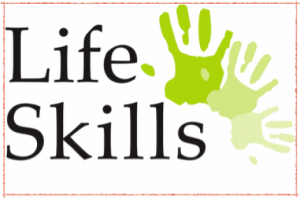He may have aced his exams, but can he clean a bathroom? The six essential talents all children should have.
The request sounded simple enough, but my 7-year-old son looked at me as if I were speaking Chinese.
“Let’s organize your action figures,” I repeated.
“Organize?” he asked, giving me his most uncomprehending stare. “I don’t get what you mean, Mom.”
I could see this was no act. Dan was genuinely confused. I was the one staring blankly now, humbly recalling all the advice I’d ever read in parenting books and popular magazines. This was a skill I should have instilled in him by now: After you play, you put your things away. Clearly, I’d failed–and by now, his inability to sort toys’ was probably irreversible. Even substituting the phrase “clean up” didn’t seem to help him much.

Then he brightened. “Oh, I get it, Mom. You mean `pick up’!” And he cheerily proceeded to heap everything into a shopping bag he’d taken to carrying about the house.
“All organized, Mom!”
If things stayed on this course, I figured Dan would wind up with the life skills of one of our teenage baby-sitters. Smart, charming, and a riot With kids–I love her dearly. She even knows CPR. But her other talents need a little polish. There was the glass plate she’d exploded in the microwave. “That surprised me,” she’d confessed, when I asked about the shards of glass sitting in the oven. “I never knew that silverware shouldn’t go in the microwave.” Dirty dishes often await me after she has pizza with the kids. Could she start the dishwasher the next time? “How do you do that?” she queried.
As it turns out, our baby-sitter’s cluelessness isn’t really noteworthy. Americans are raising a generation of boys and girls “with extremely low levels of competence in domestic skills,” according to two sociologists, Linda Waite, a professor at the University of Chicago, and Frances Goldscheider, a professor at Brown University. Most children aren’t being taught how to cook, clean, or sew–much less what it means to organize and run a household.
On average, children do about a third of the household dishes, about 25 percent of the housecleaning, about 20 percent of the laundry, and less than 20 percent of the cooking and yard work. Girls do about twice as much as boys, and by the time boys are teenagers, they do very little at all. “Teenage boys do about the same as toddler boys,” says Waite. “That’s almost nothing. We call them free riders on other people’s labor.” There is one exception to this dismal housekeeping report: Kids in single-parent homes, including boys, do much more than any other group of children.
What’s going on here? For one thing, says Waite, parents today are more intent on teaching kids nondomestic life skills. Instead of making our kids clean their rooms on Saturday morning, we’re ferrying them to soccer games. What’s more, with two parents at work in most households, we’re also busier than our parents were. “There’s a training component to many chores; you have to show kids how to make a salad or bake cookies,” says Waite. “Sometimes, it’s just easier to do the chores ourselves.”

That part of the equation is no surprise. But the fact that the majority of kids are learning less about running a household is a trend worth paying attention to, and not only because most of us are still hoping to avoid the exploding-plate phenomenon. Completing a basic task such as sorting socks or sweeping the floor can build a young child’s pride. Similarly, preparing a simple Sunday-night dinner can make a teenager feel more independent and in charge of his life. Children also learn what it takes to run a family. And while gaining a sense of responsibility, they can feel part of a team.
Here are six skills all children should learn before they leave home.
- How to Do Laundry At 3 (yes, 3), your child can help you sort clothing into lights and darks, load the washer and dryer, and fold towels. By 11 or 12, your child should be able to run a load by himself. “Learning basic housekeeping skills should happen early, not when kids are ready to go out the door,” says Kathryn J. Kvols, president of the parenting organization International Network for Children and Families, based in Gainesville, Florida.
- Dan Simpson’s parents subscribed to that notion, and it paid off. Now a junior at Rockhurst University in Kansas City, Missouri, he’s helped more than a few of his dorm mates master the mysteries of laundry. “One day, I saw this guy who was using like five machines–one for pants, one for shirts, one for socks,” says Simpson. “He had no idea what he was doing.” But Simpson is more than just a laundry guy; he also knows how to sew. “The other day, another guy came into my dorm room and asked me to sew on a button for him.”
- How to Cook By the time your child is 8, he should be in charge of at least one meal per week. It can be as simple as pouring cereal for everyone in the morning or mixing up a box of macaroni and cheese. A younger child, of course, will need more supervision until he learns to master knives and stoves. And don’t forget to teach him to clean up while he works.
- How to Budget Expenses When your child reaches junior high, start giving allowances monthly instead of weekly. Explain that he is responsible for budgeting the money. Don’t bail him out if he spends it too quickly, but you can allow him to take on extra chores for more cash. At 15 or 16, have your child open a checking account. Stay involved at first–help balance the checkbook and watch for errors–but gradually ease off as overseer.
- How to Clean a Room When your child is young, give him specific tasks, such as picking up blocks in his bedroom. Teach him how to keep the room clean throughout the week by designating spaces for dirty laundry and toys. At around 7, he should take on more, such as vacuuming and changing sheets. An older child should be asked to pitch in on cleaning other rooms–vacuuming the living room or scrubbing the tub.

Simpson’s family made such chores a weekly obligation. “It was kind of a pain. Every Saturday, each one of us had to do something, like clean the bathrooms or the kitchen. We couldn’t weasel out of it, like the other kids we saw just loafing around,” he says. But now that he’s on his own, Simpson appreciates what he learned. “It takes a lot of energy and effort to run a household with five kids,” he says. “Somebody was always breaking something or spilling something else. The house would get really messy really easy. My mom would have gone insane if she had to do it all herself.”
How to Shop for Groceries Taking a toddler to the grocery store can be a pain, but if you make him a part of the process, he’ll pick up important skills. Send your 9-year-old down the next aisle to find the right brand of laundry detergent; ask him to help you compare prices on paper towels. By the time he’s a teenager, have him help you draw up the weekly shopping list, then send him to do the shopping himself.
How to Help Themselves Teaching a child the self-sufficiency to handle any new task that comes his way is the ultimate goal, but sometimes it’s tough for parents to let go enough to let their children learn. “I think a lot of kids my age are losing the sense of how to figure things out, how to problem-solve and fix things,” Says 20-year-old Erica Engle, Who attends Fairhaven College in Bellingham, Washington. In Engle’s family, children learned such skills by being given responsibilities that required them to come up with their own solutions. For instance, an older kid can make his own doctor’s appointments. He should start by looking up numbers in the phone book (no cheating with directory assistance).
Offer guidance by asking questions. instead of giving advice. Or decide on a family vacation, then have your teenager do the research on where to stay and what to do, then make the reservations (double-checking the work is advisable, at least the first time out). “I learned a lot about how to take care of myself,” says Engle. “I’m glad that I’ve had some training in that.”